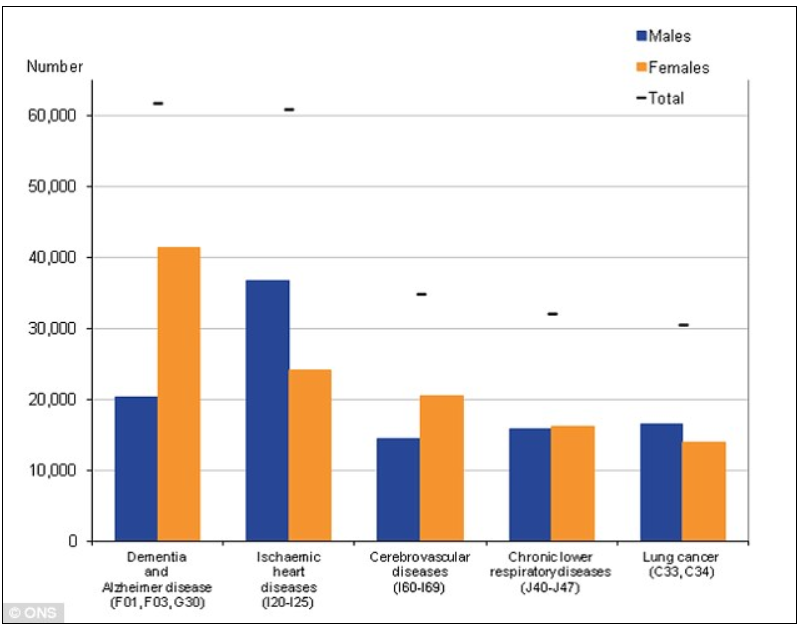Dementia is now the leading cause of death in England and Wales, new figures from the UK’s Office of National Statistics reveal.
The neurological disorder has now overtaken coronary heart disease at the top of the table. It was the cause of 61,686 deaths registered in 2015, equivalent to 11.6 per cent of the total figure. The new ONS data also shows women are more susceptible to the deadly disease than men. This may be because women are living longer than men – with the risk of developing dementia increasing with age.

Dementia killed more than twice the amount of women than men, with 41,283 losing their lives as a result of the disease, new figures show.
Its recognised that over-65s are most at risk from the disease as a result of their increased blood pressure and changes in the immune system. But records of the growing mortality rates of dementia may be because doctors are better at diagnosing the disease. The figures show that killed more than twice the amount of women than men, with 41,283 losing their lives as a result of the disease.
Elizabeth McLaren, head of life event statistics at ONS, said: ‘In 2015, dementia and Alzheimer’s disease became the leading cause of death in part because people are simply living longer but also because of improved detection and diagnosis.’
However, coronary heart disease, which has been at the top of the death table since the new figures began in 2011, was the leading cause of death in males.Figures show 36,731 men fell victim to the planet’s biggest killer – but no longer England and Wales’, which is caused by smoking, high blood pressure and high cholesterol. While 20,403 men died as a result of having dementia. Death rates from dementia have more than doubled over the last five years due to people living longer than ever before and developing the condition.
Despite the latest figures, coronary heart disease is still believed to be responsible for more than seven million global deaths yearly. It was also found to be behind 11.5 per cent of the total 529,655 deaths.
But the new figures show a large variation among age groups as people over 80 were most likely to die from dementia and Alzheimer’s.
While suicide was the leading cause of deaths for adults younger than 35. Meanwhile, breast cancer remains the leading cause of death for women aged between 35 and 49.
The statistics also found that when all forms of cancer are grouped together, it was the most common form of death – responsible for 27.9 per cent of all cases, with irculatory disease, such as heart disease and strokes were responsible for 26.2 per cent.
However, the nation’s previous leading killer, coronary heart disease, was still responsible for killing most males, nearly double that of dementia
